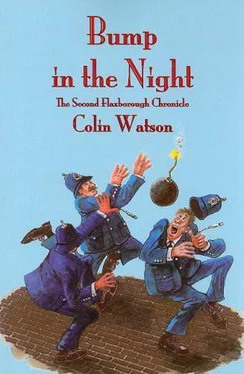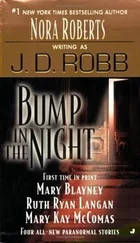“That’s what I mean. Would you say she showed resemblance to anyone in particular?”
“I realize now that she was remarkably like my wife.”
Purbright nodded. “That’s understandable. Anyone else? Anyone exceptionally tall, for instance?”
“Tall?”
“Whover stuck those bombs on the statue and that shop sign thing must have had a phenomenal reach. And no short man could have climbed the park railings, either; remember that the water fountain could only have been mined after the park closed.”
“What about a ladder? A box, even?”
“Too noticeable. It might have served for the park business, but not for the jobs in the main streets on clear summer nights. They were done very neatiy. A quick approach, a quick departure, no messing about.”
Larch picked up his pen and peered into one of his trays. “Sounds a principle worth copying,” he remarked. “Anyway, I thought you were going to use this...this holiday of yours to get some sunshine.”
Purbright rose slowly from his chair, walked to the window and stood gazing absently at the roofs of the buildings beyond the courtyard.
“Sunshine,” he repeated. “Of course. No, I don’t want to miss that.”
As the inspector strolled across the Borough Bridge, glancing down over the massive, shabby cast-iron parapet into the ebbing river, he tried to decide what he should do about the killer of the unmourned Mr Biggadyke.
He recognized, and half-admired, the parochial loyalties, compounded with a sort of pagan amorality, that made the people of Chalmsbury policeman-proof. Although he normally enjoyed his job, if only as an exercise in ingenuity, he had no illusion of being an instrument of absolute justice. Some kinds of crime made him angry; none made him righteous. He gave every criminal credit for knowing, if not what he had been about, at least what he didn’t want to have happen to him in consequence. In this he was different from most policemen, who take as a personal insult the unwillingness of a wrong-doer to be caught.
Purbright was also well aware that the public is less zealous to see the triumph of the law than it likes to pretend. Its diffidence was shown in Chalmsbury to a degree suggestive of a Robin Hood fixation. Could long years of rule by men like Larch have been responsible, he wondered.
None would blame him—perhaps he would not blame himself—for slipping out of this town that was so obviously content to allow the false interpretation of Biggadyke’s death to stand as the official record. He had some sympathy with this communal conspiracy to let a dead dog lie.
By the time he reached Mrs Crispin’s front door and let himself into the cool, dark lobby, smelling of mackintoshes and vinegar, Purbright was very nearly resigned to desertion.
He went into the dining room. The table was set already for two, but his fellow lodger had not yet arrived. Purbright picked up the copy of the Chalmsbury Chronicle which had been put by Payne’s plate and sat down to await his meal.
The report of the inquest, solidly set and so explicitly headlined in depth as to render the reading of the matter beneath almost superfluous, had been given pride of place on one of the centre pages. Purbright began to scan it rapidly and without much interest.
Then, as he turned into the second column, his eye did what a car will do on being taken round a sharp bend too quickly and inattentively. It skidded and came to rest in column three.
The inspector went on staring at the photograph before him while the truth about Biggadyke’s murder took sharp and clear form like a crystal growing out of a suddenly cooled concentrate.
After perhaps half a minute he looked down and read the caption.
“Mr Joseph Mulvaney, senior projectionist at the Rialto Cinema, Chalmsbury, has been nominated to receive the Grand Brooch of Erin, an honour conferred upon Irish nationals ordinarily resident in this country for outstanding service in the cause of Anglo-Irish relations. Mr Mulvaney (pictured here in the projection room where he has worked for the past twelve years) hopes to be able to travel to Dublin to receive his award in person when the presentations are made next Tuesday.”
Chapter Eighteen
Purbright folded the paper and replaced it on the table. He went in search of Mrs Crispin. The only occupant of the kitchen was Phyllis, shaping fishcakes with the nonchalant expertise of a prize-fighter’s masseur. She bathed him in her dimpled sir-she-said smile and said that the Missus had gone out for the evening but that his tea was on the way.
“Has Mr Payne not come in yet?”
She slid the first of the fish cakes into the frying pan. “Not unless he went straight up to his room. I suppose his car will be at the door if he’s here.”
“No, it isn’t.” Purbright cast a nervous glance at the blue cloud rising from the pan and returned to the lobby. He opened the front door and looked out, then walked quickly and quietly up the stairs.
There was no answer to his knock on Payne’s door. He pushed it open. The room was as he had last seen it; tidy, ordinary, and wearing the faintly depressing air common to all apartments, whether prison cells or bed-sitters, in which a man must share his dreams with his shoe brushes.
Purbright took a step towards the bookcase and stopped. In the photograph frame on its top shelf there was only the white card backing. The picture of the little girl standing by what he had mistakenly assumed to be a television camera had been removed.
Not that it mattered greatly now. He was clearly aware that it was the child’s face he had seen in the features of Hilda Larch. Solemnly staring out upon Cornelius Payne’s lonely little world had been Celia, photographed ten or twelve years ago—probably by her foster father—in the projection room of the cinema where he worked.
He knelt and began looking through the titles of Payne’s books. Palgrave’s ‘Golden Treasury’ was among them, and next to it an anthology of modern verse. He took out the anthology and opened it by its ribbon marker. Half way down the left-hand page was the poem by Emily Dickinson. “There’s been a death...” it began. Purbright closed the book and put it back.
In the textbook on organic chemistry he found the chapter dealing with nitro-compounds to which Payne had made his deceptively cool and co-operative reference. The instructions for making nitro-glycerin were full and precise. Purbright thought it sounded an eminently feasible operation, given laboratory equipment and expert caution. The fragment of a conversation drifted into his mind. Kebble had spoken in the same breath of Payne and the Nobel Prize. Nobel...inventor of dynamite: the man who discovered that the dangerously unstable nitrate of glycerin could be tamed by soaking it into a subsance called kieselguhr.
Purbright searched further along the shelf. At the end, among three or four volumes in faded but undamaged bindings that suggested they were old school prizes, was one entitled ‘A Boy’s Dictionary of Natural Substances’. Without much hope, he thumbed through to the K’s. It was there. Kieselguhr.
‘Kieselguhr, or Infusorial Earth, by which name it is known in the jewellery trade, is a fine powder used as a polishing agent. It is also an ingredient of dynamite.’
Downstairs a door slammed. Purbright hurriedly replaced the book and left the room, closing the door. From the landing he heard Phyllis stun the dining-room table with a plate of fishcakes. Immediately after came his summons to tea. It was like a prairie cattle call. The inspector descended and told her that he would eat as soon as he had made a short telephone call from the lobby. Payne, he noticed, still had not returned.
Larch received Purbright’s revelation with a grunt and, “What did I tell you?”
Читать дальше












